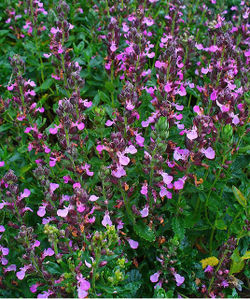Germander
From Wikiwel
Other Names: Camedrio, Chasse-Fièvre, Chêneau, Chenette, Germandrée, Germandrée Officinale, Germandrée Petit Chêne, Petit Chêne, Teucrium chamaedrys, Wall Germander, Wild Germander, Wood-sage, Dwarf Germander.
Germander ) is an aromatic plant in the “mint family” (Labiatae/Lamiaceae) belonging to the genus Teucrium.. The parts that grow above the ground are used to make medicine.
Special Precautions of Germander
- Germander is UNSAFE : Caution is advised when using this plant internally, it can cause liver damage : Germander has caused several cases of liver disease (hepatitis) and death.
- France has banned its sale. Canada does not allow germander to be included in products that are taken by mouth. However, the US still allows germander to be used in small amounts as a flavoring agent in alcoholic beverages.
- Pregnancy and breast-feeding: Germander is UNSAFE for anyone to take as medicine. If you take it while pregnant or breast-feeding, you will endanger yourself as well as your baby.
Benefits and uses of Germander are
The whole herb is anti-inflammatory, antirheumatic, aperient, aromatic, astringent, bitter, carminative, diaphoretic, digestive, diuretic, stimulant and tonic
- This small plant was once highly esteemed as a treatment for gout, inflammation, respiratory ailments.
- It is used externally as an astringent infusion on the gums and also in the treatment of wounds.
- Despite serious safety concerns, people take germander for treating gallbladder conditions, fever, stomachaches, and mild diarrhea; as a digestive aid, germ-killer, and “rinse for gout;” and to help with weight loss.
- Germander is also used for its diuretic properties, and as a treatment for weak stomachs and lack of appetite.
- It has been taken as an aid to weight loss and is a common ingredient in tonic wines.
- Some people use germander as a mouthwash to freshen the breath and kill germs in the mouth.
- In manufacturing, germander is used as a flavoring in alcoholic beverages.
- In Bulgaria a tea is made from the leaves of Teucrium chamaedrys (wall germander), called "podabiče подъбиче", to ease gastric distress.
- Teucrium polium (known popularly as felty germander) is a sub-shrub and herb native to the Mediterranean region and the Middle East. Its flowers are small and range from pink to white, and its leaves are used in cooking and for medicine, particularly for the treatment of stomach ailments. It has also shown some promise in the treatment of visceral pain. In traditional Persian medicine, T. polium (locally called 'kalpooreh') is used as an anti-hypertensive, anti-bacterial, carminative, anti-nociceptive, anti-inflammatory, anti-diarrhea, anti-diabetes and anti-convulsant agent. A scientific study in 2003 failed to find any benefit to diabetics, even though it is commonly used in the mideast for this purpose. A scientific study in 2006 found that it does have anti-nociceptive and anti-spasmodic effects. Caution should be applied with use of this herb due to its known liver and kidney toxicity.
References
- Grieve. A Modern Herbal. Penguin 1984 ISBN 0-14-046-440-9
- Chiej. R. Encyclopaedia of Medicinal Plants. MacDonald 1984 ISBN 0-356-10541-5
- Launert. E. Edible and Medicinal Plants. Hamlyn 1981 ISBN 0-600-37216-2
- Uphof. J. C. Th. Dictionary of Economic Plants. Weinheim 1959
- Mills. S. Y. The Dictionary of Modern Herbalism.
- Chopra. R. N., Nayar. S. L. and Chopra. I. C. Glossary of Indian Medicinal Plants (Including the Supplement). Council of Scientific and Industrial Research, New Delhi. 1986
